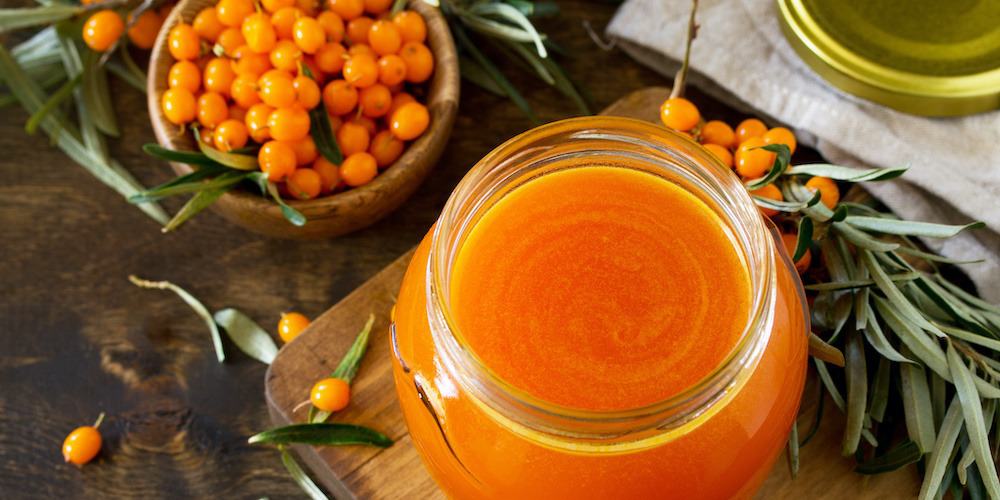BENEFITS OF SEA BUCKTHORN
✓ Fights fatigue
✓ Exerts antioxidant activity
✓ Reduces inflammation
✓ Supports cardiovascular health
✓ Potentially anti-cancer
What is sea buckthorn?
Sea buckthorn, also called « thorny willow » (Hippophae rhamnoides) is the main representative of the Elaeagnaceae family. Reaching up to 5 m in height, this shrub grows in Europe and Asia, in temperate regions. But, thanks to its unique ease of adaptation and acclimatization, it is also found at high altitude, in the Himalayas and in Siberia, which earned it the nickname « Siberian olive ».
It is often mistaken for another shrub : the strawberry tree (Arbutus unedo). Although their French names are similar, they do not have the same properties. Like rosehip, sea buckthorn has many thorns on its twigs. After flowering in spring, it produces edible berries of yellow-orange color : sea-buckthorn berries. About the size of a large olive, they contain a multitude of seeds.
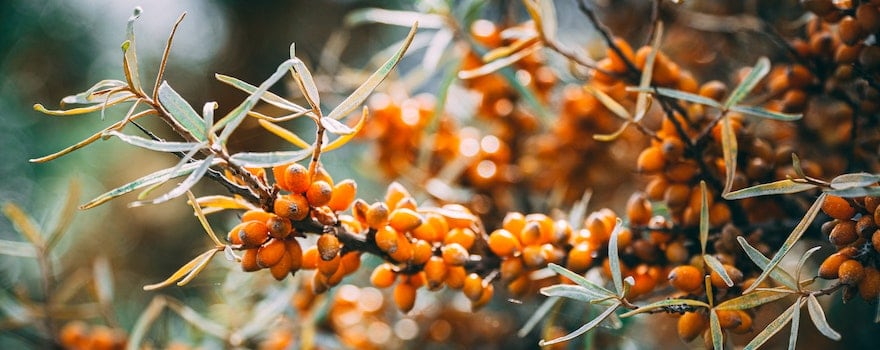
Sea buckthorn also has a dense, deep root system and long, narrow leaves. Its bark, meanwhile, is a pretty brown-gray.
All parts of the shrub contain nutrients, have health benefits and are used in herbal medicine.
Traditional medicinal plant in Tibet, Mongolia and China, sea buckthorn has been consumed there for centuries. It is used to treat circulatory problems, heart disorders and liver damage.
Recent studies have highlighted its various beneficial effects on the body. It is now recognized for fighting fatigue, protecting the body from free radicals, reducing inflammation and supporting cardiovascular health. Sea buckthorn also shows potential anti-cancer properties.
Nutritional composition
- Acides aminés
- Vitamines : provitamine-A, B1, B2, C, E, F, K, P
- Minéraux et oligo-éléments : calcium, phosphore, potassium, magnésium, fer, sodium, cuivre
- Protéines
- Lipides
- Actifs antioxydants : flavonoïdes, caroténoïdes, phénols, phytostérols, anthocyanes
- Acides gras : oméga-3-6-7-9
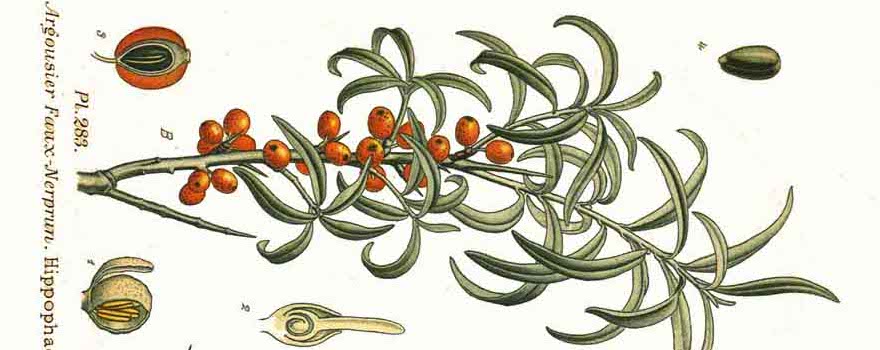
Benefits of sea buckthorn
⚡️ Fights fatigue
Sea buckthorn is a powerful natural tonic for the body. It thus helps fight temporary fatigue, bring vitality and improve mood. Its vitamin C also strengthens the immune defenses and helps prevent many winter ailments and infections : colds, flu… It is a precious ally for preventing drops in energy !
It owes this action to its high content of vitamin C or ascorbic acid. With 250 to 300 mg per 100 g, sea buckthorn berries rank among the foods richest in vitamin C. They therefore contain 5 times more than the kiwi and 30 times more than the orange!
But they also contain other anti-fatigue nutrients. Vitamins B1 and B2, for example, fight nervous fatigue. Magnesium and iron also help reduce exhaustion and contribute to energy production in the body.
This study from Jilin University (China), conducted on mice, shows the effectiveness of sea buckthorn berries in reducing fatigue.
🥝 Exerts antioxidant activity
Thanks to its exceptional vitamin C content, sea buckthorn is also able to combat free radicals. These accelerate aging, weaken the body’s cells and increase the risk of cardiovascular disease and cancer.
The action of vitamin C is complemented by other nutrients contained in the berries such as vitamin E, flavonoids, carotenoids, phenols, phytosterols and anthocyanins. Like watercress and nettle, sea buckthorn contains major phenolic compounds including kaempferol and quercetin. They exert scavenging and DNA-protective activity against certain free radicals (hydroxyl radicals, superoxide anions, DPPH radicals).
Finally, it is one of the few foods to contain fatty acids omega-3, 6, 7 and 9 simultaneously. They help preserve cells against the action of free radicals.
This study by the Institute of Nuclear Medicine and Allied Sciences in Delhi (India), conducted directly on cells, shows the antioxidant activity of sea buckthorn berries.
This other study from the same institute, also conducted on cells, concludes that sea buckthorn is a safe and effective antioxidant plant.
🌵 Reduces inflammation
In various studies, the consumption of sea buckthorn has been shown to reduce inflammation. It is effective for both skin inflammation and for inflammation of the mucous membranes, the intestines, and the joints.
To do this, sea buckthorn acts on different elements involved in the inflammatory process. On the one hand, it supports the transcription factor Nrf2 responsible for regulating the inflammatory response of the body. On the other hand, it inhibits the production of pro-inflammatory cytokines (interleukin-1ß and interleukin-6) that amplify inflammation.
Also read These natural and delicious anti-inflammatory foods
Isorhamnetin, one of sea buckthorn’s flavonoids, appears to be responsible for its action. Vitamin E also helps reduce cytokine levels. As for magnesium, it significantly lowers the level of C-reactive protein (CRP), a marker of inflammation.
This study from the Defense Institute of Physiology and Allied Sciences in Delhi (India), conducted on mice, shows the anti-inflammatory properties of sea buckthorn.
This other study from the Patanjali Research Institute (India), conducted on human cells, demonstrates the effectiveness of sea buckthorn for skin inflammation.
❤️ Supports cardiovascular health
Consuming sea buckthorn is particularly beneficial for protecting the heart and preventing cardiovascular diseases such as atherosclerosis. Indeed, it has a beneficial effect on the main risk factors such as hypercholesterolemia, hypertension, and hypertriglyceridemia.
In the heart, its antioxidants prevent damage to blood vessels caused by free radicals. Vitamin C improves blood circulation, maintains vessel elasticity, and prevents their narrowing.
To support cardiovascular health, you can also rely on its vitamin E, which contributes to vasodilation, its vitamin K, which is involved in blood clotting, and its omega-3, -6, and -9 fatty acids.
The exceptional composition of sea buckthorn allows a comprehensive action. Thus, it reduces blood pressure, lowers LDL cholesterol, or “bad cholesterol”, as well as triglyceride levels.
This study from the Defense Institute of High-Altitude Research (India), conducted on rats, shows the effectiveness of sea buckthorn berries in reducing cardiovascular risk factors.
This other study from the Indian Institute of Medical Sciences (India), carried out on rats, shows how it effectively protects the heart.
🔬 Potentially anti-cancer
In various studies, sea buckthorn has shown anti-cancer potential. Indeed, it appears to significantly inhibit the proliferation of cancer cells and induce their apoptosis (programmed cell death).
At the same time, it stimulates lymphocyte production, improves the activity of macrophages and NK cells (“natural killers”).
This study from Jilin University (China), conducted on mice, shows the anticancer and immunostimulatory activities of sea buckthorn.
This other study from Al-Farabi Kazakh National University (Kazakhstan), conducted on cancer cells, shows how sea buckthorn prevents their proliferation.
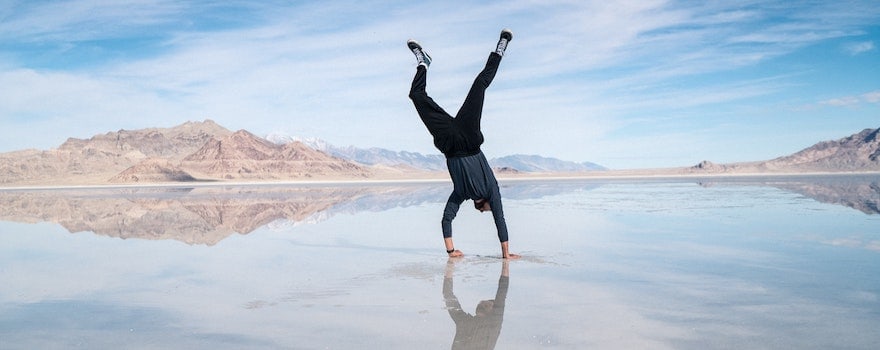
How to consume sea buckthorn?
Sea buckthorn berries
Sea buckthorn berries have a naturally sweet and slightly tangy taste. They are harvested in summer and can be eaten as is. But it is also possible to dry them. You can then eat them plain, mix them into yogurt, muesli or cereal, make an infusion with them, or incorporate them into dishes and desserts.
Once pressed, fresh berries are also used to make the famous sea buckthorn juice. It is drunk pure or diluted in water, with added sugar, honey or lucuma powder to soften its bitter taste.
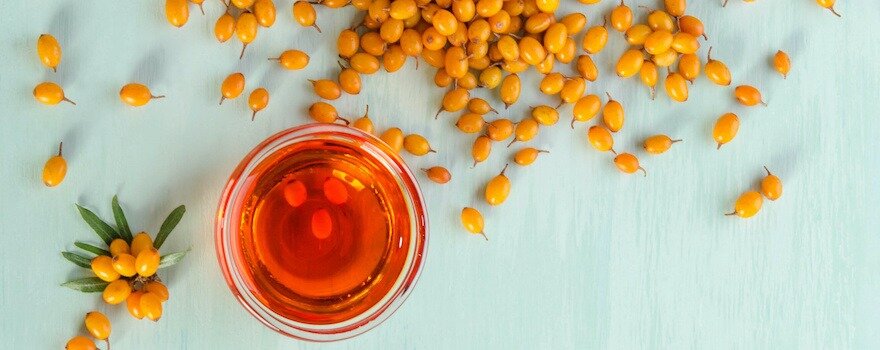
Sea buckthorn tablets
Sea buckthorn capsules and tablets are made from dried berries that are then ground into powder. It’s an easy-to-find format and convenient to take. It will suit those who do not enjoy the taste of the berries.
Choose sea buckthorn capsules with a sufficient dosage (minimum 300 mg per capsule), preferably without additives and plant-based.
Sea buckthorn powder
Sea buckthorn powder is obtained by pressing the dried berries. It is a natural dietary supplement, generally minimally processed and containing a high amount of nutrients.
It can be consumed in different ways : mixed into a drink, sprinkled over cereals or into yogurt… It will also add a tangy flavor to your homemade preparations (breads, desserts, pastries…).
Choose a powder obtained by cold pressing, 100% pure, with no additives, no preservatives and non-GMO.
Sea buckthorn oil
Pressing the seeds contained in sea buckthorn berries yields a precious vegetable oil. Because of its high content of vitamin E, carotenoids, antioxidants and fatty acids, it is ideal for the skin.
Sea buckthorn oil is anti-aging, regenerating, soothing and gives a “healthy glow” effect. You can apply it directly to your skin, incorporate it into your homemade cosmetic recipes or add a few drops to your daily skincare.
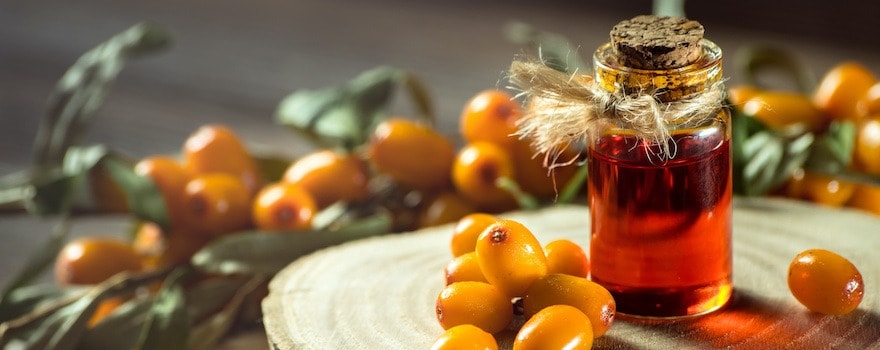
Sea buckthorn mother tincture
The sea buckthorn mother tincture comes from the maceration of the berries in a mixture of water and alcohol. Particularly rich in active compounds, this preparation nevertheless contains a large amount of alcohol. It is therefore not recommended for pregnant women, children, or people suffering from certain medical conditions.
Sea buckthorn and medicinal plants
To strengthen the body and fight fatigue, sea buckthorn can be combined with other vitamin-rich superfoods such as acerola or camu camu.
To reduce inflammation, you can pair sea buckthorn with natural anti-inflammatory foods: turmeric, ginger, moringa… Finally, to protect the cardiovascular system, you can complement your sea buckthorn consumption with Brazil nuts, basil seeds or hemp.
Sustainable consumption: prefer local, organic, and fair-trade sea buckthorn
✓ In France, sea buckthorn berries are harvested in coastal regions, such as the Bay of Somme, or in the mountains, mainly in the Alps. If you are lucky enough to be able to pick them in the wild, choose the right time. Sea buckthorn berries are very delicate fruits that become soft and crush easily. Harvesting generally begins in early August and continues until September. Remember to wear gloves because sea buckthorn is full of thorns!
✓ If wild foraging isn’t an option, you can buy dried sea buckthorn berries. Preferably choose berries harvested in France and certified organic. Some are also fair trade.
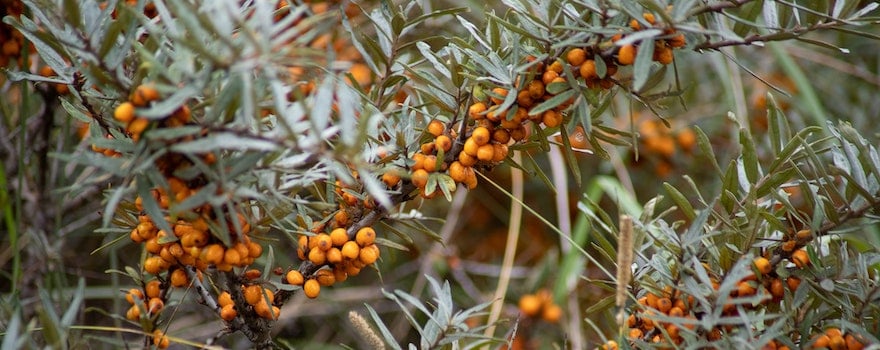
Dosage
There isn’t really a recommended dosage for sea buckthorn. Simply make sure not to consume it in excess.
Capsules should be taken with a large glass of water and before meals. Because of its high vitamin C content, avoid consuming sea buckthorn late in the day.
A 3-week course is ideal before winter or in spring, supplemented by a course of birch sap.
🍒 Sea buckthorn berries : 4 g per day
🥃 Juice : 70 ml per day
💊 Tablets : 3 to 5 capsules per day for 300 mg capsules
🥄 Powder : 2 to 4 g per day
🍯 Vegetable oil : 1 to 2 external applications per day
🧪 Mother tincture : 15 drops morning and evening
Contraindications and side effects
Consumption of sea buckthorn has certain contraindications :
- Par mesure de précaution, l’argousier est déconseillé aux femmes enceintes et allaitantes et aux jeunes enfants ;
- En raison de son action sur la circulation sanguine, les personnes souffrant d’un trouble de la coagulation ou devant subir une intervention chirurgicale doivent éviter d’en consommer ;
- Il est déconseillé aux personnes souffrant d’hypotension.
Its consumption has very few adverse effects. Only mild digestive disorders are possible. If you experience side effects, stop taking it and consult a doctor.
History, cultivation and market of sea buckthorn
Sea buckthorn is a plant known for centuries. In Europe as well as in Tibet, Mongolia and Russia, the plant has been the subject of numerous uses : preparation of beverages and spirits, production of food or medicinal products… In France, the recent INRAP archaeological discovery (National Institute for Preventive Archaeological Research) shows that sea buckthorn has been cultivated since Antiquity.
But sea buckthorn is not useful to humans alone. Highly valued by birds for its sweet berries, its flowers also attract pollinating insects. Its rapid growth and ease of adaptation make it useful for reforesting areas, combating desertification and soil erosion. Like legumes, sea buckthorn is able to enrich the soil by fixing nitrogen. Thus, it is a tree prized in permaculture.
Sources and scientific studies
Rui Li, Qing Wang, Menghao Zhao, Peiming Yang, Xiao Hu, Danwei Ouyang, 2019. Flavonoid glycosides from seeds of Hippophae rhamnoides subsp. Sinensis with α-glucosidase inhibition activity.
Weihua Ni, Tingting Gao, Hailiang Wang, Yuzhi Du, Jiayu Li, Cen Li, Lixin Wei, Hongtao Bi, 2013. Anti-fatigue activity of polysaccharides from the fruits of four Tibetan plateau indigenous medicinal plants.
Sandeep Kumar Shukla, Pankaj Chaudhary, Indracanti Prem Kumar, Namita Samanta, Farhat Afrin, Manju Lata Gupta, Upendra Kumar Sharma, Arun Kumar Sinha, Yogendra Kumar Sharma, Rakesh Kumar Sharma, 2006. Protection from radiation-induced mitochondrial and genomic DNA damage by an extract of Hippophae rhamnoides.
Raman Chawla, Rajesh Arora, Shikha Singh, Ravinder Kumar Sagar, Rakesh Kumar Sharma, Raj Kumar, Ashok Sharma, Manju L Gupta, Surender Singh, Jagdish Prasad, Haider A Khan, Anand Swaroop, A K Sinha, A K Gupta, Rajender P Tripathi, P S Ahuja, 2007. Radioprotective and antioxidant activity of fractionated extracts of berries of Hippophae rhamnoides.
Himanshi Tanwar, Shweta, Divya Singh, Shashi Bala Singh, Lilly Ganju, 2018. Anti-inflammatory activity of the functional groups present in Hippophae rhamnoides (Seabuckthorn) leaf extract.
Acharya Balkrishna , Sachin Shridhar Sakat, Kheemraj Joshi, Kamal Joshi, Vinay Sharma, Ravikant Ranjan, Kunal Bhattacharya, Anurag Varshney, 2019. Cytokines Driven Anti-Inflammatory and Anti-Psoriasis Like Efficacies of Nutraceutical Sea Buckthorn ( Hippophae rhamnoides) Oil.
Vivek Vashishtha, Kalpana Barhwal, Ashish Kumar, Sunil Kumar Hota, Om Prakash Chaurasia, Bhuvnesh Kumar, 2017. Effect of seabuckthorn seed oil in reducing cardiovascular risk factors: A longitudinal controlled trial on hypertensive subjects.
Salma Malik, Sameer Goyal, Shreesh Kumar Ojha, Saurabh Bharti, Saroj Nepali, Santosh Kumari, Virendra Singh, Dharamvir Singh Arya, 2011. Seabuckthorn attenuates cardiac dysfunction and oxidative stress in isoproterenol-induced cardiotoxicity in rats.
Hailiang Wang, Tingting Gao, Yuzhi Du, Hongxia Yang, Lixin Wei, Hongtao Bi, Weihua Ni, 2015. Anticancer and immunostimulating activities of a novel homogalacturonan from Hippophae rhamnoides L. berry.
G T Zhamanbaeva, M K Murzakhmetova, S T Tuleukhanov, M P Danilenko, 2014. Antitumor activity of ethanol extract from Hippophae rhamnoides L. leaves towards human acute myeloid leukemia cells in vitro.


